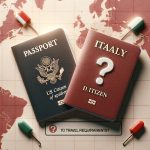As a US citizen planning to travel to Italy, it is crucial to understand the necessary documents and requirements for entry into the country. Knowing what documents are required for US citizens to travel to Italy can help avoid any travel setbacks and ensure a smooth and hassle-free trip. From passport and visa requirements to COVID-19 travel restrictions, complying with entry and exit requirements is essential for a successful journey.
First and foremost, having a valid US passport is crucial for entry into Italy. Additionally, understanding the visa requirements for US citizens traveling to Italy is essential, as well as being aware of any specific entry and exit requirements set forth by Italian immigration laws and regulations. Furthermore, with the current COVID-19 pandemic, it is important to stay informed about any travel restrictions and guidelines, including testing, quarantine, or vaccination requirements.
In addition to passport and visa requirements, obtaining necessary health documents and travel insurance is also significant when traveling to Italy as a US citizen. It is equally important to familiarize oneself with customs and duty-free allowances, especially regarding restricted or prohibited items and the declaration process. Furthermore, if you plan on traveling with minors or pets, understanding the specific requirements and regulations for their entry into Italy is essential.
By gaining an understanding of all these travel requirements for Italy as a US citizen, you can ensure a seamless travel experience while visiting this beautiful European destination. Whether it’s transportation, currency exchange or communication tips, being well-prepared with additional resources can further enhance your travel experience in Italy.
Passport and Visa Requirements
For US citizens planning to travel to Italy, understanding the passport and visa requirements is essential to ensure a smooth and hassle-free entry into the country. The most crucial document needed for US citizens traveling to Italy is a valid US passport.
It is important to note that the passport should be valid for at least three months beyond the planned date of departure from the Schengen area, which includes Italy. Additionally, if the trip extends beyond 90 days or involves non-tourist activities, a visa may be required for entry into Italy.
US citizens traveling to Italy for tourism or business purposes for stays of up to 90 days do not need a visa. However, if the visit is for other reasons such as employment, study, or long-term stay, a visa would be necessary.
It is important to check the specific visa requirements based on the purpose of your visit and ensure timely application and approval before traveling. The official website of the Italian embassy or consulate in the United States provides detailed information on visa requirements and application procedures.
Moreover, it is crucial for US citizens visiting Italy to understand any additional entry requirements due to their visa-exempt status or specific travel circumstances. It’s recommended that travelers thoroughly research and understand the necessary documents required for their particular situation to avoid any issues with entry into Italy. Understanding these passport and visa requirements can help ensure a seamless and enjoyable travel experience in Italy.
Entry and Exit Requirements
When traveling to Italy as a US citizen, it is crucial to understand the entry and exit requirements to ensure a smooth and hassle-free journey. Failure to comply with these requirements can result in travel setbacks, so it is essential to be well-informed before embarking on your trip. Here are the specific entry and exit requirements for US citizens traveling to Italy:
1. Valid Passport: All US citizens traveling to Italy must have a valid US passport. It is important to ensure that your passport is not expired and has at least six months validity beyond your planned date of departure from Italy.
2. Visa Requirements: US citizens traveling to Italy for tourism or business purposes do not need a visa for stays of up to 90 days within a 180-day period. However, if you plan to stay longer or have other purposes for your visit, you may need to obtain a visa. You can check the specific visa requirements and apply for a visa through the Italian embassy or consulate in the US.
3. Schengen Area Travel: Italy is part of the Schengen Area, which allows for border-free travel between member countries. When entering Italy, it is important for US citizens to understand that they are subject to the same entry requirements as other Schengen countries within the area.
It’s important to remember that compliance with Italian immigration laws and regulations is vital when entering and exiting the country as failure to do so can result in fines, deportation, or future travel restrictions. By ensuring that you have all necessary documents and meet entry requirements, you can make sure that your trip to Italy goes smoothly without any unexpected issues related to immigration control.
COVID-19 Travel Restrictions
Italy has implemented specific travel restrictions and guidelines due to the ongoing COVID-19 pandemic. These measures are essential for ensuring the safety and well-being of both residents and visitors to the country. As a US citizen planning to travel to Italy, it is crucial to be aware of these restrictions and comply with them to avoid any travel setbacks.
Currently, US citizens traveling to Italy are required to adhere to certain COVID-19 protocols. This may include providing proof of a negative test result taken within a specified timeframe before departure, undergoing testing upon arrival, or fulfilling quarantine requirements. Additionally, vaccination status and documentation may also be relevant factors in meeting Italy’s entry requirements.
It is important for travelers to stay updated on the latest COVID-19 travel restrictions for Italy, as these guidelines may change in response to evolving public health situations. Prior to embarking on your trip, ensure that you have the necessary documents and fulfill any testing or vaccination requirements as mandated by Italian authorities.
| COVID-19 Travel Restrictions | Requirements |
|---|---|
| Negative Test Result | Proof of negative test result (PCR or antigen) taken within 72 hours before departure |
| Testing Upon Arrival | Mandatory testing at the airport or designated facilities upon arrival in Italy |
| Quarantine | Quarantine requirements based on specific conditions and circumstances; may be waived with vaccination documentation |
Travel Insurance and Health Documents
When traveling to Italy as a US citizen, it is essential to consider the necessary documents and requirements for a smooth and hassle-free trip. One crucial aspect of travel preparation is obtaining travel insurance and any required health documents. These are important not only for your own well-being but also for compliance with Italian regulations.
Importance of Travel Insurance
Travel insurance is a vital component of any trip, including travel to Italy. It provides coverage for unexpected events such as trip cancellations, medical emergencies, baggage loss, or flight delays. As a US citizen traveling to Italy, it is advisable to obtain comprehensive travel insurance that includes medical coverage in case of illness or injury during your stay.
Health Documents Requirements
US citizens traveling to Italy should be aware of any specific health documents required for entry into the country. This may include proof of vaccination for certain diseases or other health-related requirements. It is important to check the current guidelines and regulations regarding health documents before embarking on your journey to ensure compliance with Italian laws.
In light of the ongoing COVID-19 pandemic, travelers should also stay updated on any additional health document requirements related to testing, vaccination, or quarantine measures that may be in place for entry into Italy. Being prepared with the necessary health documents and staying informed about current health guidelines will contribute to a smooth and enjoyable travel experience in Italy.
Customs and Duty-Free Allowances
When traveling to Italy, it is essential for US citizens to be aware of the customs and duty-free allowances to ensure a smooth entry into the country. Failure to comply with these regulations can result in delays and potential penalties. Here are some important points to consider:
- Customs Regulations: It is crucial for US citizens traveling to Italy to be familiar with the customs regulations. This includes knowing what items are restricted or prohibited from entering the country.
- Duty-Free Allowances: Travelers should be aware of the duty-free allowances when bringing goods into Italy. These allowances specify the quantity and value of goods that can be brought into the country without incurring duties or taxes.
- Declaration Process: Upon arrival in Italy, travelers may be required to declare certain items, especially those that exceed the duty-free allowances. It is important to understand the declaration process and adhere to any requirements set forth by Italian customs officials.
Additionally, US citizens should take note of any specific items that are subject to additional scrutiny or restrictions when entering Italy. Being well-informed about customs and duty-free allowances can help prevent any issues during travel.
It is recommended for travelers to review the official website of the Italian Customs Agency or consult with their airline or travel agency for detailed information on customs and duty-free allowances before embarking on their journey. Being prepared and knowledgeable about these regulations can contribute significantly to a hassle-free travel experience in Italy.
Traveling With Minors or Pets
For US citizens traveling to Italy with minors or pets, it is essential to be aware of the specific requirements and regulations in place. Whether you are traveling with your children or furry companions, understanding the necessary documents, permissions, and regulations is crucial to ensure a smooth and hassle-free trip.
When traveling to Italy with minors, US citizens must ensure they have the appropriate documentation for their children. This typically includes a valid passport for each child, as well as any additional requirements such as a parental consent form if one parent is traveling alone with the child. It is important to check the specific entry and exit requirements for minors in Italy before embarking on your journey.
Furthermore, it may be beneficial to familiarize yourself with any specific regulations regarding travel with minors in Italy, such as custody issues or permission requirements when only one parent is traveling with the child. Being prepared and well-informed about these regulations will help prevent any potential travel disruptions during your trip.
If you plan to bring your pets along for the journey to Italy, there are also certain documents and procedures that must be followed. Typically, US citizens traveling with pets to Italy will need to ensure their pet has an up-to-date health certificate issued by a licensed veterinarian. Additionally, proof of rabies vaccination and other specific health requirements may be necessary for entry into Italy.
Furthermore, it is important to check the airline’s policies and procedures for traveling with pets, including any crate requirements or specific documentation needed for air travel. By understanding and adhering to these requirements for traveling with pets, US citizens can avoid any unnecessary stress or complications when arriving in Italy.
Additional Travel Tips and Resources
In conclusion, traveling to Italy as a US citizen requires careful consideration of the necessary documents and requirements to ensure a smooth and hassle-free trip. It is essential to possess a valid US passport and understand the visa requirements for entry into Italy, ensuring compliance with immigration laws and regulations. Additionally, travelers must stay informed about any COVID-19 travel restrictions, obtain travel insurance, and be aware of customs and duty-free allowances.
Understanding the specific entry and exit requirements for US citizens, as well as any necessary health documents and insurance, is crucial for a successful trip to Italy. Travelers should also familiarize themselves with the regulations for traveling with minors or pets if applicable. Finally, additional travel tips and resources such as transportation options, currency information, and communication resources can further enhance the travel experience.
Frequently Asked Questions
What Is Required for a U.S. Citizen to Visit Italy?
U.S. citizens visiting Italy need a valid passport, with at least six months validity remaining. As a member of the Visa Waiver Program, Americans can visit Italy for up to 90 days without a visa.
What Documents Do I Need to Fly to Italy?
When flying to Italy, U.S. citizens need their valid passport as the primary document for entry. Additionally, it’s essential to have a return ticket and proof of sufficient funds for your stay in Italy.
Do American Citizens Need a Visa for Italy?
American citizens do not need a visa for short visits to Italy under 90 days due to the Visa Waiver Program. However, if you plan on staying longer or for other purposes such as work or study, then you would need to apply for the necessary visa in advance.

I’m a passionate traveler, writer, and Italophile. My fascination with Italy’s history, art, and culture has led me on countless adventures across the Italian landscape. Through “I Live Italy,” I share my love for this extraordinary country and aims to inspire others to explore its boundless beauty.





